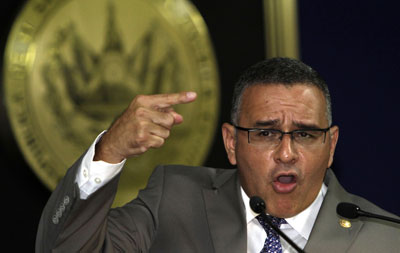“El Salvador is committed to guaranteeing the safety of El Faro and its staff so they can continue their investigative work,” David Rivas, spokesman for President Mauricio Funes Cartagena, told CPJ in a recent phone conversation. The government’s pledge came after groundbreaking reporting by the digital newspaper about secret negotiations in which local gangs, known as Maras, said they would limit murders in exchange for official concessions, like having imprisoned gang members transferred to lower-security prisons.
As a result of their reporting, El Faro‘s staff members have reported being followed and photographed. “This is a very sensitive issue so we have to ensure all safeguards are taken,” said Rivas, who indicated that President Funes is aware of the situation and has ordered Minister of Security David Munguía Payés to meet with El Faro. I told Rivas that reporting by El Faro on this issue is of great national interest and that the government must guarantee the news website can investigate without fear.
This is especially true after the release on March 19 of a statement signed by the two most powerful gangs (Mara Salvatrucha and Mara 18), endorsed by Roman Catholic leaders, and delivered to several local outlets. The communiqué, in which the gangs confirmed they have called a truce and are now in a period of reflection, described El Faro‘s reporting on the negotiations as “irresponsible, skewed, and unprofessional.” In an editorial on March 26, El Faro said the statement was written such that it did not appear to be authored by gang members, alleging it had been produced by officials involved in the negotiations with the Maras.
Although Funes denied that his government struck a deal with the gangs to reduce the number of murders in exchange for better prison conditions, the Salvadoran president acknowledged at a March 28 press conference that the administration “facilitated” the truce between gangs by transferring 30 gang leaders to lower-security prisons, according to press reports. Murders have dropped abruptly in the two weeks since the truce, from an average of 14 a day to six, the press said. El Salvador, according to a recent U.N. report, has one of the highest homicide rates in the world, with 66 homicides per 100,000 people.
El Faro first reported on a criminal network involving politicians in May 2011, in an article titled “El cartel de Texis” (The Texis Cartel). El Faro‘s director Carlos Dada told CPJ that in February, nine months after the story ran, the site’s staff members reported unidentified persons following and photographing them. Dada said he suspected the police were following staff members to identify sources for the May article.
The minister of security, retired Gen. Munguía Payés, told CPJ he had no knowledge of anyone following El Faro staff members and that no such order had come from any government office. Later, however, officials held a meeting with members of several media organizations, excluding El Faro, at which they claimed to have intelligence suggesting gang members were angered by El Faro‘s reporting and that the site’s staff was in danger, Dada said. The next day, the minister told El Faro employees they were at risk of being attacked by the gangs, but did not provide any information and did not offer any protection for the staff, Dada said.
When asked about the threats made to El Faro‘s staff, Munguía Payés told CPJ the ministry had a “responsibility to give protection to any Salvadoran who is at risk and is threatened.” He said the police had complied with this responsibility by notifying El Faro about the information they received, and that they were in the process of confirming the credibility of the threats. If the threats were corroborated, he said, they would discuss possible protection measures with El Faro. Dada said yesterday that the site has not heard anything further from Munguía Payés.
CPJ research shows that journalists covering El Salvador’s widespread gang violence risk becoming targets themselves. In 2009, Christian Poveda, a French-Spanish filmmaker who had documented gang violence in El Salvador for decades, was slain by members of the Mara 18 gang.
